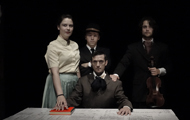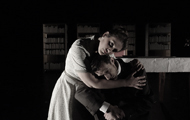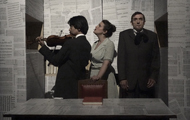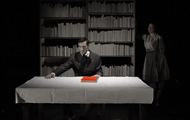MARC KRONE
'I trust singers: they have big souls and great instincts.'
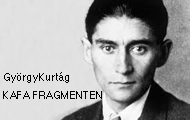
Franz Kafka was a German writer who lived from 1833 till 1924.
Just before he dieв ,he asked his friend Max Brod to destroy his, largely unpublished, oeuvre.
Max, fortunately, did not keep his promise and created a posthumous edition of Kafka's work. Kafka has since been considered one of the most important authors of the twentieth century.
Sixty years after Kafka's death György Kurtág composes the Kafka ‘Fragments Op. 24’.
At first sight ‘Op. 24’ is a mysterious and inaccessible piece: like good wine it takes its time to reveal its beauty and secrets.
At the same time it is more than worthwhile to take the patience and to emerge oneself in this little-heard (and even less staged) work.
The ‘fragments’ are a typical of the80s. The piece seems to have head nor tail, and the various texts of Kafka, on which the compositions are based, seem randomly chosen.
Kurtág does not ask us to listen with our head, but forces us to experience the world of Kafka through his music: associative.
Kurtág pulls us into Kafka’s alienating world through his music.
He doesn’t tries to paint a portrait or to tell a coherent story, but makes uslook and listen through Kafka’s ears and eyes.
Not surprisingly, because in the80s, in theater as in music, linear dramaturgy was often abandoned and there was a quest for freedom in form.
This is the starting point for this staging.
At the beginning of the piece (which Kurtág divided in four parts) we find the author in limbo between life and death. He is confronted with the fact that his work still exists.
He is compelled to face the fact that his work lives on, and with his oeuvre remains the pain and loneliness that are at the basis of work.
In the performance violin, singing and dancing are each a facet of Kafka's being. While the singer gives voice to Kafka's thoughts and memories, the violinist interpretes the emotions. In the dancer we see Kafka trying to avoid in all kinds of ways to relive his past
But his past (in the form of, among others, his father, his best friend and his mistress) forces him time and again to face reality. .
In the second part he tries to escape in his dreams, to find out in the third part that this flight is pointless.
To find peace, he shall have to accept that his work is significant and that he, therefore, will have to embrace the pain and suffering that goes with it.
Only when he – in part four-decides to do that, he can be released from his own inner prison and is it possible to say goodbye to this world.
He disappears in the midst of Kurtágs sounds and leaves us with his brilliant work.
Just before he dieв ,he asked his friend Max Brod to destroy his, largely unpublished, oeuvre.
Max, fortunately, did not keep his promise and created a posthumous edition of Kafka's work. Kafka has since been considered one of the most important authors of the twentieth century.
Sixty years after Kafka's death György Kurtág composes the Kafka ‘Fragments Op. 24’.
At first sight ‘Op. 24’ is a mysterious and inaccessible piece: like good wine it takes its time to reveal its beauty and secrets.
At the same time it is more than worthwhile to take the patience and to emerge oneself in this little-heard (and even less staged) work.
The ‘fragments’ are a typical of the80s. The piece seems to have head nor tail, and the various texts of Kafka, on which the compositions are based, seem randomly chosen.
Kurtág does not ask us to listen with our head, but forces us to experience the world of Kafka through his music: associative.
Kurtág pulls us into Kafka’s alienating world through his music.
He doesn’t tries to paint a portrait or to tell a coherent story, but makes uslook and listen through Kafka’s ears and eyes.
Not surprisingly, because in the80s, in theater as in music, linear dramaturgy was often abandoned and there was a quest for freedom in form.
This is the starting point for this staging.
At the beginning of the piece (which Kurtág divided in four parts) we find the author in limbo between life and death. He is confronted with the fact that his work still exists.
He is compelled to face the fact that his work lives on, and with his oeuvre remains the pain and loneliness that are at the basis of work.
In the performance violin, singing and dancing are each a facet of Kafka's being. While the singer gives voice to Kafka's thoughts and memories, the violinist interpretes the emotions. In the dancer we see Kafka trying to avoid in all kinds of ways to relive his past
But his past (in the form of, among others, his father, his best friend and his mistress) forces him time and again to face reality. .
In the second part he tries to escape in his dreams, to find out in the third part that this flight is pointless.
To find peace, he shall have to accept that his work is significant and that he, therefore, will have to embrace the pain and suffering that goes with it.
Only when he – in part four-decides to do that, he can be released from his own inner prison and is it possible to say goodbye to this world.
He disappears in the midst of Kurtágs sounds and leaves us with his brilliant work.
| Music | Georgy Kurtag |
| After texts by | Kafka |
| Adaptation and Stagedirection | Marc Krone |
| Choreogaphy | André de Jong |
| Violin | Shin Sihan |
| Mezzo Soprano | Katharine Dain |
| Actors | Anne Brackman |
| Tim Brackman | |
| Pieter de Koe |
| Netherlands 2016 |

